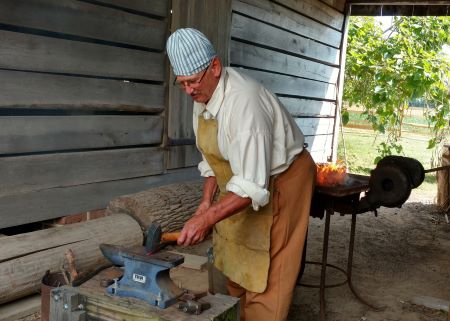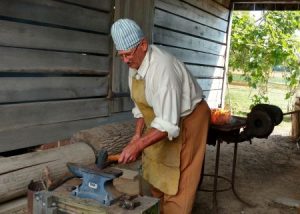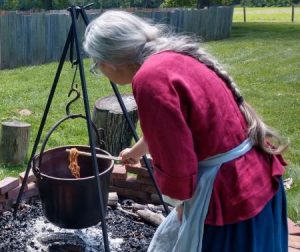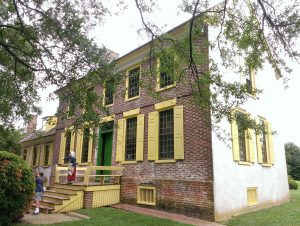“18th Century Trades Day” at Dover, Del.’s John Dickinson Plantation on Oct. 12, 2019
Historical and Cultural Affairs | Kent County | Newsroom | Date Posted: Thursday, October 3, 2019
Historical and Cultural Affairs | Kent County | Newsroom | Date Posted: Thursday, October 3, 2019

(DOVER, Del.—Oct. 3, 2019)—On Saturday, Oct. 12, 2019, visitors to the home of the “Penman of the Revolution” will explore Colonial-era job opportunities during the “18th Century Trades Day” that will take place between 10:30 a.m. and 4 p.m. at the John Dickinson Plantation located at 340 Kitts Hummock Road in Dover, Del. All activities are free and open to the public. For additional information, call 302-739-3277.

“18th Century Trades Day” will provide opportunities to dye fabric 1700s-style; preserve food in the smokehouse; mold bricks out of clay; and watch a blacksmith forging iron implements, and a carpenter making wooden shingles and pegs. In addition, members of the Thistledown Fiber Arts Guild will be conducting demonstrations of spinning, weaving, knitting and other fabric arts; and the 1740 mansion house will be open for guided tours throughout the day.

The John Dickinson Plantation, Delaware’s first National Historic Landmark, was the home of John Dickinson, a founding father of the United States, a framer and signer of the U.S. Constitution and “Penman of the Revolution.” The Georgian-style mansion stands as a memorial to this American patriot, legislator and farmer. The museum is a partner site in the First State National Historical Park.
About the mansion house …
The mansion house at the John Dickinson Plantation, also known as Poplar Hall, was built in 1740 for Samuel Dickinson (father of John Dickinson). John Dickinson spent his boyhood years here and later, after inheriting the property from his father, utilized the plantation as his country estate in addition to his city homes in Philadelphia, and later, Wilmington.

About John Dickinson (1732-1808) …
John Dickinson, born in Talbot County, Md. on Nov. 8, 1732; moved with his parents in 1740 to Dover, Del. where he studied under a private teacher; studied law in Philadelphia and at the Middle Temple in London; was admitted to the bar in 1757 and commenced practice in Philadelphia; member of the Assembly of “Lower Counties,” as the state of Delaware was then called, in 1760; member of the Pennsylvania Assembly in 1762 and 1764; delegate to the Stamp Act Congress in 1765; member from Pennsylvania to the Continental Congress 1774-1776 and from Delaware in 1779; brigadier general of Pennsylvania militia; president of the state of Delaware in 1781; returned to Philadelphia and served as president of Pennsylvania 1782-1785; returned to Delaware; was a member of the federal convention of 1787 which framed the U.S. Constitution and was one of the signers from Delaware; died in Wilmington, Del. on Feb. 14, 1808; interment in Wilmington Friends Meetinghouse Burial Ground.
Source: Biographical Directory of the United States Congress

The John Dickinson Plantation is administered by the Division of Historical and Cultural Affairs, an agency of the State of Delaware. The division enhances Delaware’s quality of life by preserving the state’s unique historical heritage, fostering community stability and economic vitality and providing educational programs and assistance to the general public on Delaware history. The division’s diverse array of services includes operation of five museums which are accredited by the American Alliance of Museums, administration of the State Historic Preservation Office, conservation of the state’s archaeological and historic-objects collections, operation of a conference center and management of historic properties across the state. Primary funding for division programs and services is provided by annual appropriations from the Delaware General Assembly and grants from the National Park Service, Department of the Interior, a federal agency. However, the contents and opinions expressed in the division’s programs and services do not necessarily reflect the views and policies of the Department of the Interior.
-End-
Contact:
Jim Yurasek
Delaware Division of Historical and Cultural Affairs
Phone: 302-739-7787
E-mail: Jim.Yurasek@delaware.gov
Web: http://history.delaware.gov
Keep up to date by receiving a daily digest email, around noon, of current news release posts from state agencies on news.delaware.gov.
Here you can subscribe to future news updates.
Historical and Cultural Affairs | Kent County | Newsroom | Date Posted: Thursday, October 3, 2019

(DOVER, Del.—Oct. 3, 2019)—On Saturday, Oct. 12, 2019, visitors to the home of the “Penman of the Revolution” will explore Colonial-era job opportunities during the “18th Century Trades Day” that will take place between 10:30 a.m. and 4 p.m. at the John Dickinson Plantation located at 340 Kitts Hummock Road in Dover, Del. All activities are free and open to the public. For additional information, call 302-739-3277.

“18th Century Trades Day” will provide opportunities to dye fabric 1700s-style; preserve food in the smokehouse; mold bricks out of clay; and watch a blacksmith forging iron implements, and a carpenter making wooden shingles and pegs. In addition, members of the Thistledown Fiber Arts Guild will be conducting demonstrations of spinning, weaving, knitting and other fabric arts; and the 1740 mansion house will be open for guided tours throughout the day.

The John Dickinson Plantation, Delaware’s first National Historic Landmark, was the home of John Dickinson, a founding father of the United States, a framer and signer of the U.S. Constitution and “Penman of the Revolution.” The Georgian-style mansion stands as a memorial to this American patriot, legislator and farmer. The museum is a partner site in the First State National Historical Park.
About the mansion house …
The mansion house at the John Dickinson Plantation, also known as Poplar Hall, was built in 1740 for Samuel Dickinson (father of John Dickinson). John Dickinson spent his boyhood years here and later, after inheriting the property from his father, utilized the plantation as his country estate in addition to his city homes in Philadelphia, and later, Wilmington.

About John Dickinson (1732-1808) …
John Dickinson, born in Talbot County, Md. on Nov. 8, 1732; moved with his parents in 1740 to Dover, Del. where he studied under a private teacher; studied law in Philadelphia and at the Middle Temple in London; was admitted to the bar in 1757 and commenced practice in Philadelphia; member of the Assembly of “Lower Counties,” as the state of Delaware was then called, in 1760; member of the Pennsylvania Assembly in 1762 and 1764; delegate to the Stamp Act Congress in 1765; member from Pennsylvania to the Continental Congress 1774-1776 and from Delaware in 1779; brigadier general of Pennsylvania militia; president of the state of Delaware in 1781; returned to Philadelphia and served as president of Pennsylvania 1782-1785; returned to Delaware; was a member of the federal convention of 1787 which framed the U.S. Constitution and was one of the signers from Delaware; died in Wilmington, Del. on Feb. 14, 1808; interment in Wilmington Friends Meetinghouse Burial Ground.
Source: Biographical Directory of the United States Congress

The John Dickinson Plantation is administered by the Division of Historical and Cultural Affairs, an agency of the State of Delaware. The division enhances Delaware’s quality of life by preserving the state’s unique historical heritage, fostering community stability and economic vitality and providing educational programs and assistance to the general public on Delaware history. The division’s diverse array of services includes operation of five museums which are accredited by the American Alliance of Museums, administration of the State Historic Preservation Office, conservation of the state’s archaeological and historic-objects collections, operation of a conference center and management of historic properties across the state. Primary funding for division programs and services is provided by annual appropriations from the Delaware General Assembly and grants from the National Park Service, Department of the Interior, a federal agency. However, the contents and opinions expressed in the division’s programs and services do not necessarily reflect the views and policies of the Department of the Interior.
-End-
Contact:
Jim Yurasek
Delaware Division of Historical and Cultural Affairs
Phone: 302-739-7787
E-mail: Jim.Yurasek@delaware.gov
Web: http://history.delaware.gov
Keep up to date by receiving a daily digest email, around noon, of current news release posts from state agencies on news.delaware.gov.
Here you can subscribe to future news updates.